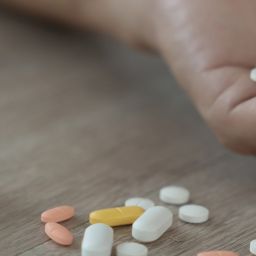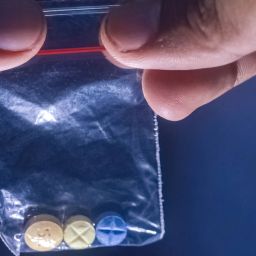Let’s talk about something that often gets swept under the rug, especially when we’re thinking about young adults: the profound and often devastating impacts of substance abuse on their sexual health. We tend to associate substance use with immediate, visible consequences, but the ripple effects can extend far into intimate areas of life. You know, things that really matter, like connection, pleasure, and emotional closeness. It’s not just about partying too hard; it’s about a pattern of behavior that can seriously derail your sexual well-being. So, let’s peel back the layers and understand how substance use disorder (SUD) can mess with a young person’s sex life, and why it’s so important to address this issue head-on.
Unpacking the Connection Between SUD and Sexual Dysfunction
You might be thinking, “How exactly does getting high or drunk affect my sex life?” Well, it’s a complicated dance of biology and psychology, especially when considering the impacts of substance abuse. First, let’s look at the physiological side. Many substances, from alcohol to opioids to stimulants, interfere with the body’s natural processes. Think about it: alcohol, a depressant, can dampen nerve responses, making it harder to achieve and maintain erections. Similarly, opioids can suppress testosterone levels, leading to decreased libido and erectile dysfunction. Stimulants, while initially enhancing desire in some cases, can eventually lead to exhaustion and performance issues. It’s like trying to run a marathon on a broken treadmill – you might start strong, but you’re bound to crash. Moreover, certain drugs can disrupt hormonal balance, which is crucial for healthy sexual function. These changes aren’t always immediate; they can develop gradually over time, making it harder to pinpoint the cause. This slow erosion of function, often a hallmark of substance use disorder (SUD), can lead to frustration, anxiety, and relationship problems, creating a vicious cycle that’s hard to break.
How SUDs Impact Emotional Intimacy
Beyond the physical, there’s the emotional landscape. Substance use disorder (SUD) often comes with a host of psychological issues like anxiety, depression, and low self-esteem. When you’re struggling with these challenges, connecting intimately with someone becomes incredibly difficult. Imagine trying to open up and be vulnerable when you’re constantly battling feelings of worthlessness or fear. The situation resembles a hopeless endeavor, such as building a temporary structure against a powerful force. Furthermore, the secrecy and shame that often accompany SUD can create barriers to open communication with partners. You might feel like you have to hide your habits, which leads to dishonesty and mistrust. These emotional roadblocks can lead to a sense of isolation and disconnection, making it harder to experience pleasure and satisfaction in sexual relationships. It’s not just about the act itself; it’s about the emotional connection that makes sex meaningful.
Effects of Drug Abuse on Sexuality
We often focus on the immediate consequences of drug use, like impaired judgment and risky behavior. However, the long-term effects of drug abuse on sexuality can be far more damaging. Chronic substance use can lead to changes in brain chemistry, affecting mood, motivation, and reward pathways. These changes can diminish your overall interest in sex and make it harder to experience pleasure. Think of it like listening to your favorite song on repeat until it loses its charm – the constant exposure desensitizes you. Additionally, the lifestyle associated with SUD can take a toll on relationships. Neglect of personal hygiene, financial problems, and erratic behavior can create tension and resentment, making it difficult to maintain healthy sexual relationships. It’s not just about the individual; it’s about the impact on the entire relationship dynamic.
Sexual Performance and SUD
Let’s be real, sexual performance is a big deal for many young adults. When SUD enters the picture, it can throw this delicate balance completely off-kilter. Substances, particularly those associated with substance abuse, can interfere with the body’s natural arousal and response mechanisms, leading to difficulties with erection, lubrication, and orgasm. Alcohol, for instance, is a notorious culprit for erectile dysfunction, even in small amounts. Stimulants can lead to premature ejaculation or difficulty reaching orgasm. Opioids can suppress libido and make it harder to achieve arousal. It’s like trying to conduct an orchestra with instruments that are out of tune. Moreover, the anxiety and stress associated with SUD, a form of substance use disorder, can exacerbate these problems. Performance anxiety becomes a self-fulfilling prophecy, creating a cycle of fear and avoidance. This can lead to feelings of inadequacy and shame, further damaging sexual well-being.
The Impacts of Substance Abuse and Risky Sexual Behaviors
One of the most concerning impacts of substance abuse is the increased likelihood of engaging in risky sexual behaviors. When judgment is impaired, you’re more likely to make choices you wouldn’t normally make. This can include having unprotected sex, engaging in sex with multiple partners, or participating in sexual activities you later regret. It’s like driving without a seatbelt – you’re putting yourself at unnecessary risk. These behaviors can lead to sexually transmitted infections (STIs), unplanned pregnancies, and emotional trauma. The consequences can be devastating, impacting not only your physical health but also your emotional and mental well-being. It’s a sobering reminder that substance use can have long-lasting, life-altering effects.
Exploring the Challenges
If you or someone you know is struggling with SUD and experiencing sexual difficulties, it’s crucial to seek help. Many resources are available, including therapy, support groups, and medical treatment. Talking to a healthcare professional can provide valuable insights and guidance. It’s like having a compass when you’re lost in the woods. Furthermore, support groups can provide a sense of community and understanding. Sharing your experiences with others who have been through similar challenges can be incredibly validating and empowering. Be assured that others are with you, and resources exist to aid you.
Understanding SUD: A Deeper Look at Substance Use Disorder
Substance use disorder (SUD) is a complex condition that affects a person’s brain and behavior, leading to an inability to control the use of legal or illegal drugs, medications, or alcohol. It’s not just about occasional use; it’s about a pattern of behavior that interferes with daily life. SUD can lead to significant problems in relationships, work, and health. It’s like being trapped in a maze, where every turn leads you further into confusion and despair. Recognizing the signs of SUD is the first step toward getting help. These signs can include cravings, withdrawal symptoms, and an inability to cut back on substance use despite negative consequences. Early intervention is key to preventing long-term damage to sexual health and overall well-being.
Sexual Well-Being and Recovery
Overcoming substance use disorder is an ongoing process, rather than a final achievement. It requires commitment, patience, and self-compassion. Reclaiming your sexual well-being is an important part of this process. As you work toward sobriety, you may notice improvements in your physical and emotional health. Your libido may return, and you may find it easier to connect intimately with your partner. It’s like tending a garden – it takes time and effort, but the results are worth it. Open communication with your partner is essential during this time. Sharing your feelings and needs can strengthen your relationship and create a safe space for intimacy. Remember, recovery is possible, and you deserve to experience healthy and fulfilling sexual relationships.
Breaking Down Barriers to Sexual Health
One of the biggest challenges in addressing the impacts of substance abuse on sexual health is the stigma surrounding both issues. People may feel ashamed or embarrassed to talk about their struggles, which can prevent them from seeking help. It’s like trying to have a conversation in a room full of whispers – it’s hard to be heard. To dismantle these limitations, we must engage in frank and truthful exchanges. We need to create a culture where people feel safe to talk about their experiences without fear of judgment. To effectively fight this challenge, it’s essential to promote knowledge and understanding. By understanding the connection between SUD and sexual health, we can create a more supportive and inclusive environment for young adults.
The Role of Education: Promoting Healthy Sexual Practices
Education plays a critical role in preventing and addressing the impacts of substance abuse on sexual health. Young adults need access to accurate information about the risks associated with substance use and risky sexual behaviors. This includes education about STIs, contraception, and the importance of consent. It’s like equipping someone with a map before they embark on a journey. Furthermore, education should address the emotional and psychological aspects of sexual well-being, emphasizing the importance of healthy relationships and communication. By promoting healthy sexual practices, we can empower young adults to make informed choices and protect their sexual health.
Reducing the Impacts of Substance Abuse
Prevention is the key to reducing the impacts of substance abuse on sexual health. This includes early intervention programs, access to treatment, and community-based initiatives. Creating supportive environments where young adults feel safe and valued can reduce the likelihood of substance use. It’s like building a strong foundation for a house – it provides stability and support. Additionally, promoting healthy coping mechanisms for stress and emotional challenges can reduce the reliance on substances. This includes encouraging physical activity, mindfulness, and creative expression. By investing in prevention, we can create a healthier and safer future for young adults.
The Long-Term Effects of Drug Abuse on Sexuality
The long-term effects of drug abuse on sexuality can be profound and lasting. Chronic substance use can lead to irreversible changes in brain chemistry and hormonal balance. This can result in persistent sexual dysfunction, even after achieving sobriety. It’s like scarring on a wound – it may fade, but it never completely disappears. Additionally, the emotional and psychological damage caused by SUD can take years to heal. This can include feelings of shame, guilt, and low self-esteem. It’s important to remember that recovery is a process, and healing takes time. With patience, support, and professional help, young adults can reclaim their sexual well-being and build healthy, fulfilling relationships.
Improving Sexual Performance After SUD Recovery
Improving sexual performance after SUD recovery requires a multifaceted approach. This includes addressing both the physical and psychological aspects of sexual function. Physical therapy, medication, and lifestyle changes can help improve erectile function, lubrication, and orgasm. It’s like rebuilding a bridge – it requires a combination of materials and expertise. Additionally, therapy and counseling can help address performance anxiety, relationship issues, and emotional trauma. Honest and direct conversations with your partner are important during this period. Sharing your feelings and needs can strengthen your connection and create a safe space for intimacy. Remember, improvement is possible, and you deserve to experience pleasure and satisfaction in your sexual relationships.
The Importance of Sexual Well-Being in Young Adults
Sexual well-being is more than just physical function. It encompasses the emotional, psychological, and social aspects of sexuality. It’s like a garden that needs sunlight, water, and fertile soil to thrive. Addressing the impacts of substance abuse on sexual health requires a comprehensive approach that considers all these factors. This includes promoting healthy relationships, communication skills, and self-esteem. It’s like building a strong foundation for a house – it provides stability and support. By focusing on sexual well-being, we can empower young adults to experience fulfilling and satisfying sexual relationships.
Sexual Health and the Role of Mental Health
Mental health plays a significant role in sexual health. Conditions like anxiety, depression, and trauma can impact libido, arousal, and sexual satisfaction. It’s like trying to run a race with a heavy backpack – it’s much harder. SUD often co-occurs with mental health disorders, creating a complex web of challenges. Addressing both issues is essential for improving sexual well-being. Therapy, medication, and support groups can provide valuable tools for managing mental health conditions. It’s like having a support team cheering you on during a marathon. By prioritizing mental health, we can create a foundation for healthy and fulfilling sexual relationships.
Creating a Supportive Environment for Young Adults
Creating a supportive environment for young adults is crucial for addressing the impacts of substance abuse on sexual health. This includes providing access to accurate information, resources, and support services. It’s like building a safety net – it catches you when you fall. Additionally, promoting open and honest conversations about sexuality can reduce stigma and encourage help-seeking behavior. Creating safe spaces where young adults feel heard and understood is essential for fostering healthy sexual relationships. It’s like building a community center – it provides a place for people to connect and support each other.
The Connection Between SUD and Relationship Dynamics
The impacts of substance abuse can significantly affect relationship dynamics. SUD can lead to dishonesty, mistrust, and emotional distance. It’s like a crack in a foundation – it weakens the entire structure. These challenges can make it difficult to maintain healthy and fulfilling sexual relationships. Open communication, couples therapy, and support groups can help couples navigate these challenges. It’s like having a guide during a difficult hike – it provides direction and support. By addressing the root causes of relationship problems, couples can rebuild trust and intimacy.
The Impacts of Substance Abuse and Consent
Respectful and healthy sexual relationships require clear consent. The impacts of substance abuse can impair judgment and decision-making, making it difficult to give or receive informed consent. It’s like trying to make a decision while under the influence – your judgment is clouded. This can lead to sexual encounters that are regretted or traumatic. Educating young adults about the importance of consent and the risks associated with substance use is essential for preventing sexual assault and promoting healthy sexual practices. It’s like teaching someone how to swim before they go into the deep end – it provides them with the tools they need to stay safe.
Sexual Health and the Importance of Self-Care
Self-care is essential for maintaining sexual health. This includes prioritizing physical, emotional, and mental well-being. It’s like tending a garden – it requires regular maintenance. Practices like exercise, healthy eating, and stress management can improve libido, mood, and overall sexual well-being. Additionally, setting boundaries and practicing self-compassion can help create a positive and fulfilling sexual experience. It’s like building a strong foundation for a house – it provides stability and support. By prioritizing self-care, young adults can enhance their sexual well-being and build healthy relationships.
Effects of Drug Abuse on Sexuality: A Call for Action
The effects of drug abuse on sexuality are a serious public health concern. Addressing this issue requires a collaborative effort from individuals, families, communities, and healthcare professionals. It’s like building a bridge – it requires a team effort. We need to create a culture where open and honest conversations about sexuality and substance use are encouraged. By providing access to education, treatment, and support services, we can empower young adults to make informed choices and protect their sexual health. Keep in mind that each action contributes to a more healthful tomorrow.
Seeking Professional Help?
If you or a loved one is grappling with the impacts of substance abuse on your sexual health, know that you don’t have to face this alone. Reach out to us today for compassionate support and guidance. We offer confidential resources and personalized treatment plans to help you reclaim your well-being and build healthier relationships. Don’t hesitate—take the first step toward a brighter future now.
Conclusion
In conclusion, the impacts of substance abuse on sexual health are multifaceted and far-reaching. From physical dysfunction to emotional disconnection, SUD can derail a young adult’s sexual well-being. It’s crucial to recognize the connection between SUD and sexual difficulties and to seek help when needed. Reclaiming your intimacy after SUD requires a commitment to recovery, open communication, and self-compassion. By addressing the root causes of sexual performance issues and promoting healthy sexual practices, young adults can rebuild trust, intimacy, and pleasure in their relationships. Remember, there are people who care, and assistance is readily available. Take that step, reach out, and reclaim your sexual health.









